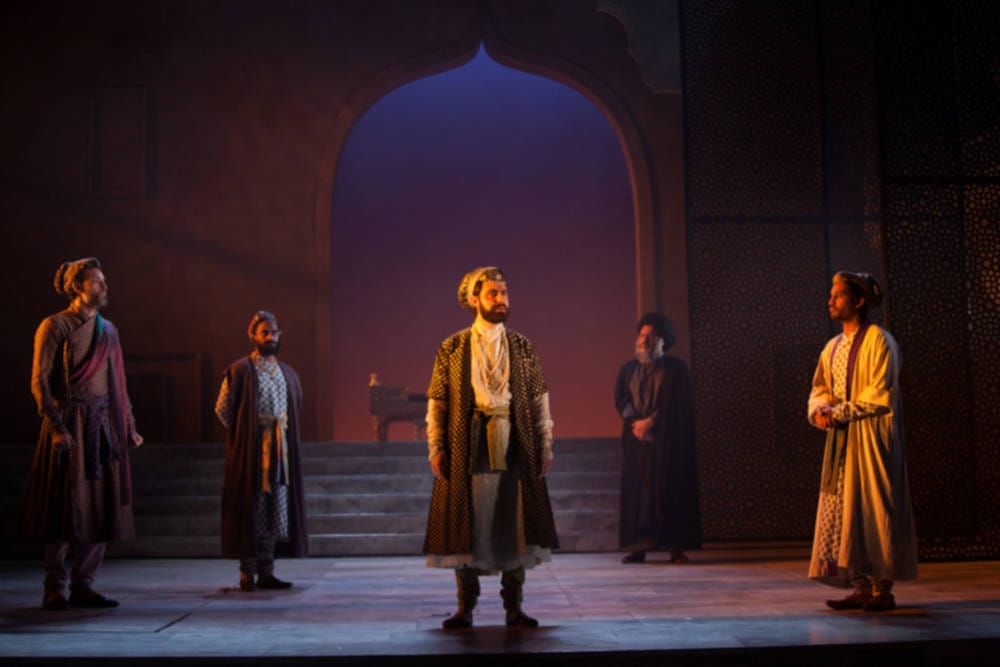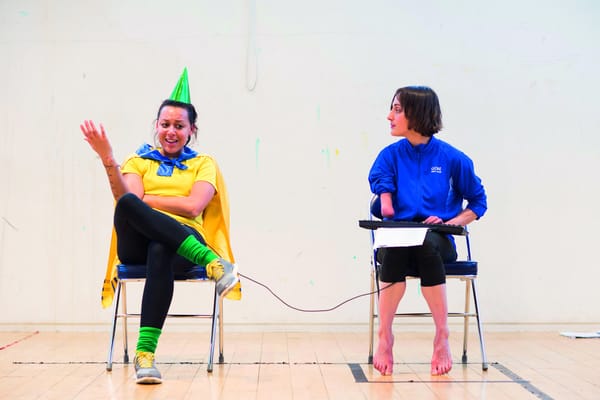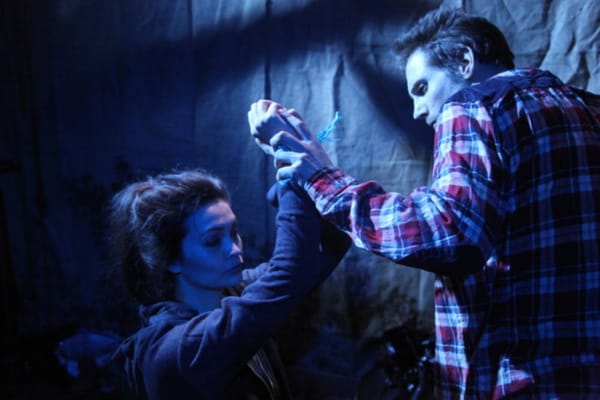Dara: Somewhat Lost in Translation
Fred Fyles heads to Hindustan for the National Theatre’s new play

The first challenge that presented itself to writer Tanya Ronder and director Nadia Fall, when planning on bringing a production of Pakistani play Dara to the National Theatre, was how to tell a story that is a legend in the Indian subcontinent, but largely unknown in the UK? Dara, originally written by Pakistani playwright Shahid Nadeem, had an outing in India a couple of years ago, where most are familiar with the struggle between brothers Dara Shikoh and Emperor Aurangzeb for the throne of the Mughal Empire. While some aspects of the play are translated well, notably the set design and performances, on the whole much of the nuance and drama is lost on its journey to the South Bank.
Taking place across the Muslim Mughal Empire, which stretched from Agra to Bengal, Gujarat to Afghanistan, Dara opens in the year 1659, two years after emperor Shah Jahan’s illness triggered a battle for supremacy between the eligible princes, of whom Dara and Aurangzeb were the major players. Defeated by his brother’s army, Dara is captured, shackled and paraded before his beloved people, and tried as an apostate of Islam. While that is the basic gist of the story, it belies the complexity of the script, which zips between time-zones frequently, and explores the stories of a number of other characters.
The speed with which things move on means that it can be difficult to follow the plot
While this certainly makes for a dynamic plot line, the speed with which things move on means that it can be difficult to follow the plot. We are shifted through time and space so fast that it feels like we are developing motion sickness; dates and places are projected on the back of the stage with such high frequency it becomes hard to know where we are, who the people are meant to be, or why we should care. In one – admittedly extreme example – a character you’d think would be pretty central to the plot is introduced in one scene, ends that scene by starting to cough, and is dead by the next. When the action is this rapid, we are afforded no opportunity to get to know the characters, much less relate to them.
That being said, the performances from the cast in general is very solid, in particular those of Aurangzeb, played by Sargon Yelda, and Itbar, the imperial eunuch slave, played by Chook Sibtain. Sibtain imbues his character with just the right amount of sympathy and righteous anger; he is clearly conflicted between a feeling of duty towards his masters, and a resentment that bubbles just below the surface at those who have enslaved and mutilated him – he is an injured bird, imprisoned in a gilded cage. You would expect Zubin Varla, who plays Dara himself, to be the strongest actor in the company, and on the whole his performance is solid. There are some moments that threaten to dip over into melodrama, especially when his sonorous voice begins to take on a somewhat hammy tone, but he recovers himself in a blistering court scene, coming towards the end of part 1, which must be at least 45 minutes long. Varla, reduced to rags, rages against his captors, furious not because of his debasement, but because of their misunderstanding of his appreciation of Sufi Islam.
Another factor that interferes with our sympathies towards the characters is simply how one-dimensional they seem
Unfortunately, this marks the pinnacle of the drama, and in the second half things descend into a somewhat chaotic series of images and scenes, which add up to an unsatisfying conclusion. The character of Dara in particular seems to lose the fire that burnt inside him during the first half of the production; instead of the relatable, princely character we saw during the courtroom scene, we are left with a man who no longer responds to any kind of stimulus. While I appreciate that this is supposed to be part of his Zen attitude towards life, it means that the character is laconic to near-brain death; it is indeed difficult to sympathise with a character who is unable to express any kind of emotion.
Another factor that interferes with our sympathies towards the characters is simply how one-dimensional they seem; while I appreciate it is difficult to bring characters who have entered into legend into living, breathing actors, Dara and Aurangzeb are really not much more than a collection of tropes. What should be an exploration of different paths of Islam ends up simply being a tale of radicalism vs. multiculturalism, a debate which has long ceased to be a fresh topic for the arts.
While the staging at the National Theatre is always of a good quality, I feel that for this production further comment is warranted; the set they have put together for Dara is nothing short of stunning. Comprising mainly of white marble, the set has a classical feel, almost like a Greek stage transported to Agra. The ornate detailing found on the screens used to divide the stage and the decorative motifs on the balconies is clearly influenced by the design of the Taj Mahal, commissioned in memory of Dara’s mother and seen by his imprisoned father from his cell window.
The set the National Theatre have put together for Dara is nothing short of stunning
What is striking about the set is simply how large is makes the stage seem, inflating the Lyttelton Theatre to what looks like twice its normal size. While the characters are indeed dwarfed by their surroundings, the stage never seems imposing or stale – you can really imagine people working, living, and loving within the walls of the palace. Scene changes are ‘assisted’ by performances and dancers, who seem to add little to the overall production; that being said, the decision to bring in a trio of musicians, playing harmonium, santoor, and percussion, is an inspired one, adding another dimension to the play, making the action seem just that more dramatic.
Overall, despite the impression I may have given above Dara is a very competent production; competent, but not excellent. Issues with the pacing, characterisation, and plot-line – which may be linked to Ronder’s decision to add in a number of key characters who were not in the original text – make it somewhat impenetrable, meaning it is very hard to sympathise with the characters, much less care what they have to say. The stage is excellent, and it is so refreshing to see an all-minority cast putting on a production at a major London venue, Dara does not live up to what it promises.
Dara is on at the National Theatre until 4th April. Tickets from £15









